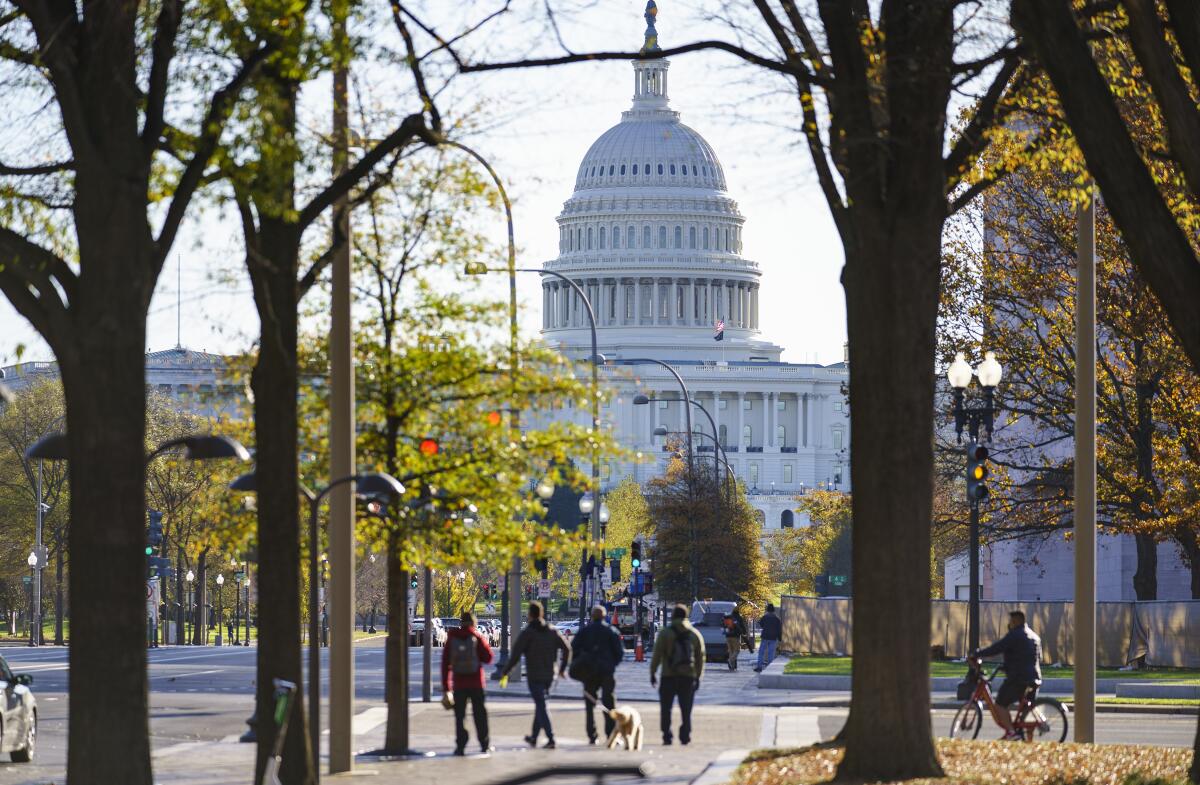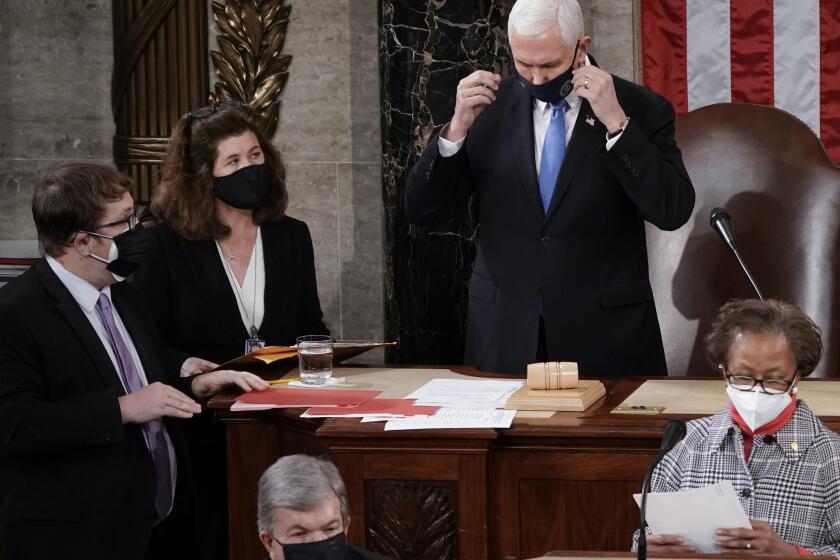Democrats make last effort to keep immigration reforms in social spending bill

WASHINGTON â House Democrats last month passed legislation that would offer protection from deportation for millions of immigrants for the first time in more than 35 years.
The immigration provisions â part of a $1.85-trillion social spending bill â probably represent Democratsâ last chance to achieve reforms to the nationâs immigration system before the 2022 midterm election. After that, if Republicans gain the majority in Congress, the possibility of winning any protections for immigrants would probably drop exponentially.
For the record:
7:49 a.m. Dec. 6, 2021A previous version of this story incorrectly stated the title of Patrice Lawrence. Lawrence is executive director of UndocuBlack.
The measures now face an uphill battle in the Senate, which is expected to take up the legislation this month, and they could be stripped by the Senate parliamentarian well before that. Adding to the challenges there, immigrant advocates are at odds over provisions that would provide work permits to nearly 7 million immigrants living in the country illegally. The protections would provide temporary respite from deportation but not a path to citizenship.
Some immigrants and their allies say the provisions are a desperately needed start, while others call them unacceptable, a divide that echoes a long debate over whether immigrants should conform to some immediate protection from deportation or hold out for permanent legal status.
The bill, which Democrats call âBuild Back Better,â would also help immigrants living in the country legally but who are stuck in a years-long green card backlog, and it would beef up the cash-strapped federal Citizenship and Immigration Services agency.
Gabriel Valladolid, 47, said essential workers like him deserved a pathway to citizenship. But Valladolid, who works tomato fields in San Joaquin, Calif., longs to visit the two adult children in Mexico he hasnât seen in 17 years.
He recalled when California lawmakers extended driverâs licenses to residents here illegally and some people complained because they couldnât be used for air travel and were marked differently than regular licenses. Valladolid said the licenses were better than nothing â immigrants were used to having their cars impounded with every traffic stop. He feels the same way now.
âWhatever they want to give us,â Valladolid said. âThe BBB is a good start. Adelante, pero ya.â We want it now.
The centerpiece of the billâs immigration provisions gives qualified immigrants who have lived in the U.S. since January 2011 the chance to apply for temporary work permits and protection from deportation under a process called âparole.â
Nearly 60% of immigrants in the country illegally would be eligible for the protections â some 6.5 million people, according to a Congressional Budget Office analysis. The work permits would last five years and could be renewed once, extending protections into 2031. Those eligible could also access federal benefits including Medicare and Medicaid, and receive permission to travel outside the country.
An estimated 3 million of those immigrants, according to the CBO, are the immediate relatives of adult U.S. citizens and could eventually apply for green cards once granted parole.
The legislation also seeks to modernize the system to better reflect current immigration trends. It would expand processing capacity by adding $2.8 billion to U.S. Citizenship and Immigration Services. And it would enable the agency to ârecaptureâ hundreds of thousands of visas that have gone unused each year since 1992 because of administrative complications, helping more than 5 million immigrants â mostly from India â who are stuck in the green card backlog.
The parliamentarianâs position
The nonpartisan CBO said the bill overall would add $160 billion to the deficit over a decade. The White House estimates that the bill would reduce the deficit.
To get the legislation through the Senate, Democrats are using a procedure called reconciliation that allows them to pass the bill with 50 votes plus the tiebreaking vote of the vice president. But the process requires all measures be directly related to the federal budget.
Parliamentarian Elizabeth MacDonough determines whether policies pass muster. Senate Democratic aides met with MacDonough on Nov. 23 to discuss the plan for work permits, and she did not immediately rule it out, according to sources familiar with the discussions.
Next MacDonough will formally assess whether the plan complies with the so-called Byrd rule, which requires that the legislationâs impact on government spending or revenue outweigh any âextraneousâ policy changes. That assessment could come this week.
This is the third attempt by Senate Democrats to add protections for immigrants to the bill. MacDonough rejected the previous two.
The first offered a path to citizenship for certain immigrants without lawful status, including those who were brought to the country as children, temporary protected status holders, farmworkers and other essential workers.
The second sought to allow immigrants who entered the country before 2010 to obtain residency if they were currently without lawful status.
The Senate parliamentarian deals a blow to immigration advocates hoping to secure a path to citizenship in the Democratsâ social spending bill.
âChanging the law to clear the way to [lawful permanent resident] status is tremendous and enduring policy change that dwarfs its budgetary impact,â MacDonough wrote of the first proposal.
âA permanent underclassâ
Democratic Reps. Lou Correa of Santa Ana, Adriano Espaillat of New York and JesĂşs âChuyâ Garcia of Illinois all staked their votes for the broader bill on the immigration provisions and had advocated for the inclusion of a pathway to citizenship. Those lawmakers signed a letter, along with dozens of others, calling on Senate leaders to disregard MacDonoughâs opinion, but the effort lacks wide support.
If Democrats are hoping the failed attempts will mollify advocates, they may be disappointed. Angelica Salas, executive director of CHIRLA, or the Los Angeles-based Coalition for Humane Immigrant Rights, said anything less than a path to citizenship is unacceptable.
Salas said offering work permits would put millions more people on the same roller coaster that those with temporary protected status and Deferred Action for Childhood Arrivals (DACA) protection have faced. Both programs, administrated by the executive branch, were rolled back under the Trump administration, but legal battles kept the protections in place.
âThis is just about the Democrats,â she said. âIf they canât fight for citizenship in Build Back Better, tell me how theyâre going to fight for our folks afterward and try to say that weâll get it through another process that is dependent on Republicans? They canât defraud our community again. I donât want to be satisfied with such low expectations.â
But Giev Kashkooli, political and legislative director at United Farm Workers, called the current immigration package substantial. The chance for millions of immigrants to work legally, visit family members theyâve been separated from for decades, and for some to access a pathway to citizenship through immediate U.S. citizen family members â all represent a significant step forward, he said.
âItâs the least that the women and men who feed us deserve. But they are significant â people do not have them now,â he said.
Kashkooli said that immigration wins have always been challenging. He pointed to 2012 when President Obama announced the creation of DACA, and the following year the Democratic-controlled Senate passed a comprehensive immigration reform bill with 15 Republican votes that ultimately failed in the Republican-controlled House.
âWinning a breakthrough, even when you fall short on what youâve won before, doesnât mean you canât build on that breakthrough,â he said.
But Patrice Lawrence, executive director of UndocuBlack, argued that accepting the current plan and advocating for a more permanent solution later is unrealistic.
âWhat worries me the most is that we will be creating a permanent underclass of undocumented people and they will be locked into that underclass for a long time,â Lawrence said. âThe window for Congress to act is very slim. The reconciliation package is it because next year is an election year and other things become more pressing.â
Times staff writer Jennifer Haberkorn contributed to this report.
More to Read
Sign up for Essential California
The most important California stories and recommendations in your inbox every morning.
You may occasionally receive promotional content from the Los Angeles Times.








![[20060326 (LA/A20) -- STATING THE CASE: Marchers organized by unions, religious organizations and immigrants rights groups carry signs and chant in downtown L.A. "People are really upset that all the work they do, everything that they give to this nation, is ignored," said Angelica Salas of the Coalition of Humane Immigrant Rights. -- PHOTOGRAPHER: Photographs by Gina Ferazzi The Los Angeles Times] *** [Ferazzi, Gina -- - 109170.ME.0325.rights.12.GMF- Gina Ferazzi/Los Angeles Times - Thousands of protesters march to city hall in downtown Los Angeles Saturday, March 25, 2006. They are protesting against House-passed HR 4437, an anti-immigration bill that opponents say will criminalize millions of immigrant families and anyone who comes into contact with them.]](https://ca-times.brightspotcdn.com/dims4/default/34f403d/2147483647/strip/true/crop/1983x1322+109+0/resize/840x560!/quality/75/?url=https%3A%2F%2Fcalifornia-times-brightspot.s3.amazonaws.com%2Fzbk%2Fdamlat_images%2FLA%2FLA_PHOTO_ARCHIVE%2FSDOCS%2854%29%2Fkx3lslnc.JPG)




